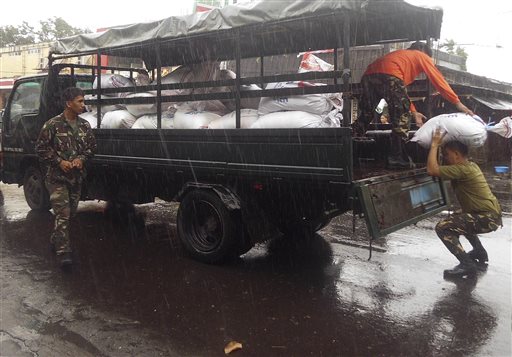COA blames patronage politics

Soldiers unload sacks of rice and other necessities at an evacuation center in Legazpi City, Albay, in anticipation of typhoon Rammasun on July 15, 2014. According to the Commission on Audit, in the DILG’s 2013 preparedness assessment report, “it was evident that coordination between and among LGUs, national government agencies, civil society organizations and the private sector left much to be desired.” AP
MANILA, Philippines–The Commission on Audit (COA) has blamed “patronage politics” for the government’s failure to provide protection and relief from disasters to poor Filipinos in the country’s high-risk zones.
In its 2014 report “Assessment of Disaster Risk Reduction and Management at the Local Level,” the COA said patronage system continued to be the bedrock of the socio-cultural foundation of disaster management in the country despite the enactment of “The Philippine Disaster Risk Reduction and Management Act of 2010.”
“As a result of patronage, decisions are based on electoral considerations rather than on evidence of technical assessments. This results in underinvestment in vital national level infrastructure projects and the concurrent sourcing of micro-level projects,” the COA said.
While the local government units (LGUs) were tasked to take the lead in preparing for disasters, the COA noted that the Department of Interior and Local Governments (DILG) did not give them the resources and the training on how to handle emergencies.
“In the DILG’s 2013 preparedness assessment report, it was evident that coordination between and among LGUs, national government agencies, civil society organizations and the private sector left much to be desired,” the COA said.
Article continues after this advertisementThe COA cited its audit of the DILG, the main conduit between the national and local governments, which showed that 96 percent of the donated funds remained unutilized as of end-December 2012.
Article continues after this advertisement“This deprived the intended beneficiaries of the much-needed immediate assistance,” the COA said.
This was the same story last year when the government used only P3.8 million, or less than 1 percent of the total donations received from local and foreign sources as of end-December last year.
Another factor cited by the COA for the ills in the government’s disaster risk management was the imbalance between a town’s budget level and vulnerability to typhoons and earthquakes.
“LGUs with higher vulnerability to disasters are also those which belong to the low-income class. While the law encourages LGUs to invest in disaster risk management, the current system, however, puts LGUs in poorer and island provinces, for example, at a disadvantage as they have lower revenues and thus less available resources for their calamity fund,” the COA said.
The agency warned that such inequality could “impinge” on how the government would react to more hard-prone areas in the country.
RELATED STORIES
UN exec lauds PH for disaster risk reduction initiatives